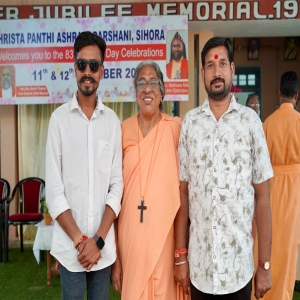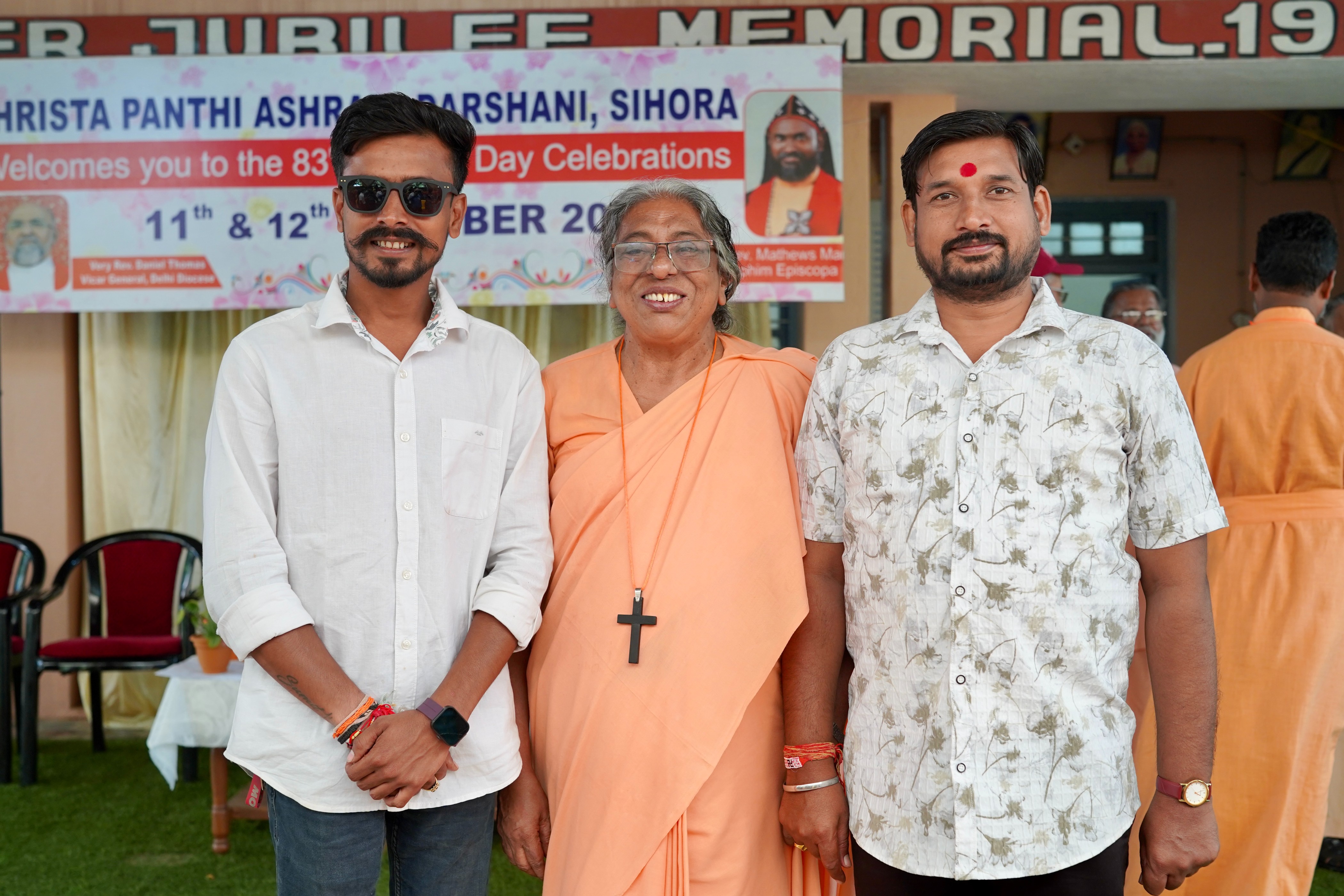
 A. J. Philip
A. J. Philip

Dear Shri Bhajan Lal Sharma Ji,
Last fortnight, I travelled to Sihora in Madhya Pradesh to attend the 83rd Christa Panthi Ashram Day. It was my third visit to that tranquil village, but my first to witness the annual celebration of an ashram that has quietly served humanity for over eight decades. I took the train, as I usually do, with a book to keep me company — Geoffrey Hanks' 70 Great Christians: The Story of the Christian Church.
I made the mistake of not covering the book.
A fellow passenger, curious about what I was reading, leaned over and asked if there were any Indians featured in it. I told him yes — Sadhu Sundar Singh, a saintly figure who found Christ in his youth and became a symbol of faith without borders. I added that the book also spoke of people who came to India and left it richer in spirit and substance.
There was William Carey, who helped abolish sati and female infanticide, established India's first modern college — the Senate of Serampore College (1818) — and started three newspapers, one each in English, Bengali, and Hindi. Then there was Dr Ida Scudder, who founded the Christian Medical College in Vellore after seeing upper-caste men refuse medical help for their dying wives rather than allow her father, a doctor, to touch them. Amy Carmichael, who rescued temple children from a life of bondage and abuse in South India, was another name on the list.
The man listened intently and then asked, "What does your religion offer its followers?"
Though I am not a theologian, I replied, "It offers salvation."
That led to a follow-up question: "What is salvation?"
I told him, perhaps clumsily, "Salvation means forgiveness of sins, inner peace, reconciliation with God, freedom from guilt and fear, moral renewal, and the hope of eternal life."
I don't know how many marks a theology professor would give me for that answer — but I soon realised that I might have committed, under your new law, a crime punishable by imprisonment for life.
As the train supposedly rolled through Rajasthan (no, it did not, I found out), it struck me that my spontaneous explanation could have been construed as an attempt to convert someone. Under the new anti-conversion law that you piloted through the Assembly, this simple exchange of ideas — a harmless conversation about faith — could have made me a criminal.
I must compliment you, though, for your responsiveness. When the draft Bill was first circulated, the Vishwa Hindu Parishad found it "too meek and too weak." You promptly toughened it. Governor Haribhau Kisanrao Bagde gave his assent on October 8, and Rajasthan now proudly boasts the most draconian anti-conversion law in India. It is certainly a new feather in your Hindutva cap!
Under this law, the person I was speaking to could have filed a complaint alleging that I tried to entice him with promises of "salvation." I would have been arrested on the spot — since the offence is cognisable and non-bailable — and the burden of proving my innocence would rest squarely on me. Not on the prosecution. The police would not have had to look far for evidence.
The back cover of my book asks, "Why was 87-year-old Polycarp thrown to the lions?" I had two digital versions of the Bible — one in English, another in Malayalam — downloaded on my iPad. And my ticket mentioned my destination, Sihora, where three young priests from Travancore set up a mission in 1942 to spread the Gospel through service.
You may not know that the Rashtriya Swayamsevak Sangh (RSS), in whose shakha you began your political career, once tried to oppose the Sihora mission. The three Malayali priests who founded the Christa Panthi Ashram did not come to convert; they came to serve. They started educational and health programmes for the villagers. When the local shakha pramukh objected, the missionaries withdrew, saying, "If you can serve the people, we'll gladly leave."
Months later, the villagers begged them to return — because the RSS volunteers had no desire to continue the work. Those three men stayed on, living celibate lives, serving the poor, teaching the children, and healing the sick. Their tombs, along with those of 11 evangelists and nuns, still stand in Sihora — whitewashed, silent witnesses to a life of selfless devotion. I wish you had the time to make a visit to Sihora to see what kind of changes the Sihora Mission brought about.
Yet, their humble example did not prevent Hindutva organisations from campaigning for laws to prevent "conversions." The Congress Chief Minister of Madhya Pradesh, DP Mishra, obliged by setting up the Shankar Niyogi Committee to study "conversion activities." The committee's report, which you might find illuminating, praised the Sihora Ashram for its exemplary social service in a region once sunk in superstition and illiteracy.
Before Madhya Pradesh could legislate, Orissa took the lead. Yours is now the twelfth state to enact such a law. But here is a curious fact: not one Christian has ever been convicted under these so-called "freedom of religion" laws. Now, trial is seen as a punishment. There is a saying, "If you aim at nothing, you will hit every time". You can round up any Christians and allow them to rot in jail. Your purpose of terrorising them would have been achieved!
Every BJP-ruled state tries to make its version even harsher. And now, with Rajasthan's new law, you have set a new national record for intolerance.
Now, tell me, Mr Chief Minister, why are you afraid of 0.14 per cent? That's the Christian population in Rajasthan — one in every 700 people. Do you really believe they threaten the faith, culture, or demography of your state? You have the police, the bureaucracy, and the machinery of government behind you, and an overwhelming Hindu majority — 88 per cent of the population.
Muslims make up just over 9 per cent. Yet you and your government seem to see danger in every minority.
Let's be clear: Christians have a religious obligation to share what they call the "Good News." The Constitution of India — which you have sworn to uphold — guarantees them that right. Conversion, in the biblical sense, refers to turning away from sin and turning toward God, a change of heart and mind inspired by divine grace. It is not about inducement or coercion; it is about conscience and choice.
When Jesus was born a Jew, he did not discard his Jewish identity. Faith does not erase culture; it renews it. A Hindu, a Muslim, or a Christian turning toward God is not betraying their roots — they are seeking truth. There is, after all, only one God, whatever name we call Him by.
Your law goes beyond Orwellian imagination. If I were to discuss my faith with someone and they belonged to a Scheduled Caste, a Scheduled Tribe, or a woman, the punishment could extend to life imprisonment. That, for me, would mean death — since I cannot survive a day without my daily dose of medicines and insulin shots.
The fine can go up to one crore rupees. I don't have that kind of money. If the conversation had taken place in my home instead of on a train, a gazetted officer, nominated by the district magistrate, could have ordered the demolition of my house, with or without the use of a bulldozer. My family would be roofless, but I would get a roof in prison.
And if I were ever acquitted, after years of trial and tribulation, your law provides no compensation for wrongful imprisonment or demolition.
Recently, the Chief Justice of India, Justice BR Gavai — condemned "bulldozer justice." But your law institutionalises it. You have enshrined in legislation what the Constitution explicitly forbids: punishment before trial, destruction before proof.
Under your law, anyone seeking to change their religion must inform the District Magistrate 90 days in advance. The officer must publish the notice for public scrutiny. Any random citizen can object.
Imagine the consequences. In a country where men have been lynched for allegedly storing beef in their refrigerators, or shot dead in trains for "looking Muslim," what fate awaits someone who announces his intention to embrace another faith? This provision is not about regulation; it is about intimidation. It ensures that no one dares to exercise their freedom of belief.
You have two children. I do not know if they are married, but under your law, an inter-religious marriage would require them to prove that there is no element of conversion involved. What kind of state is that which demands bureaucratic certification for love?
India has celebrated inter-faith marriages — Saif Ali Khan and Kareena Kapoor, Riteish and Genelia, Shah Rukh Khan and Gauri Chhibber, Shirish Kunder and Farah Khan. Your law would make such unions impossible. If your logic prevails, the next step will be to ensure that couples marry only within their caste and gotra. That would truly please the khap panchayats.
In the weeks before the Bill was enacted, there were scattered police raids and vigilante actions against Christian prayer meetings in Alwar, Dungarpur, and Jaipur. These incidents, as reported by Citizens for Justice and Peace (CJP), were not isolated. They were coordinated campaigns of harassment, often conducted with the cooperation of local police and officials.
This is not governance; it is persecution disguised as vigilance. And while your law treats conversion to Christianity or Islam as a criminal act, it treats conversion to Hinduism as a homecoming — ghar wapsi. Why this double standard? Why is freedom of religion a one-way street? Your law mocks the spirit of Article 25 of the Constitution, which guarantees to all citizens the right to freely profess, practise, and propagate their faith.
You passed this law even as the Supreme Court is hearing challenges to similar laws enacted by nine other states. By enacting an even harsher version, you have shown contempt not only for the pending judicial process but also for the constitutional principles you are bound to protect.
The RSS founder, "Guruji" MS Golwalkar, under whom you once drew inspiration, called Christians, Muslims, and Communists "internal threats" to India. By legislating along those lines, you have resurrected that divisive vision. You have turned Rajasthan, once known for its valorous kings and syncretic culture, into a laboratory of fear.
Do you realise what message this sends to the world? That in the land of the Buddha, Kabir, and Gandhi, faith itself is now a criminal offence?
Mr Chief Minister, you have pushed Rajasthan into the Dark Ages. You have turned conscience into contraband, faith into felony, and love into litigation. You have handed bulldozers to prejudice and given it the authority of law.
The spirit of Rajasthan once evoked images of chivalry, poetry, and pluralism — of a people who could fight invaders yet shelter saints, who could defend their land yet open their hearts.
Today, it stands diminished by fear. No Christian, no Muslim, no Hindu
gains when freedom is curtailed. The suppression of one community today becomes the template for suppressing all tomorrow.
History will not remember you for the roads you built or the slogans you coined. It will remember you for this law — the law that made a conversation on salvation a crime, that made the sharing of faith an act of treason, and that sought to chain the Indian soul to a bureaucrat's approval.
When the historians of the future write about this time, they will say: Rajasthan once stood at the crossroads of faith and freedom — and its Chief Minister chose fear.
Is that how you wish to be remembered?
Yours etc